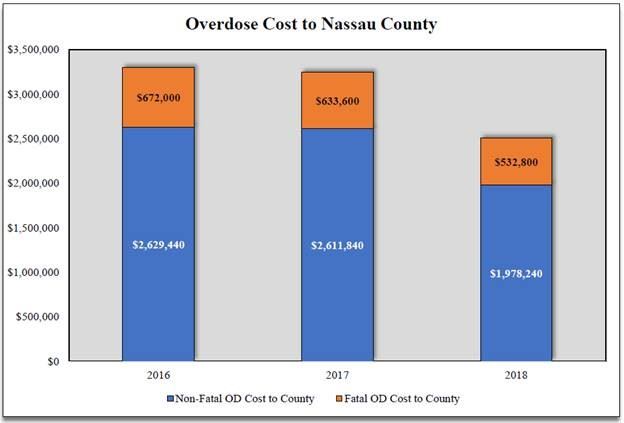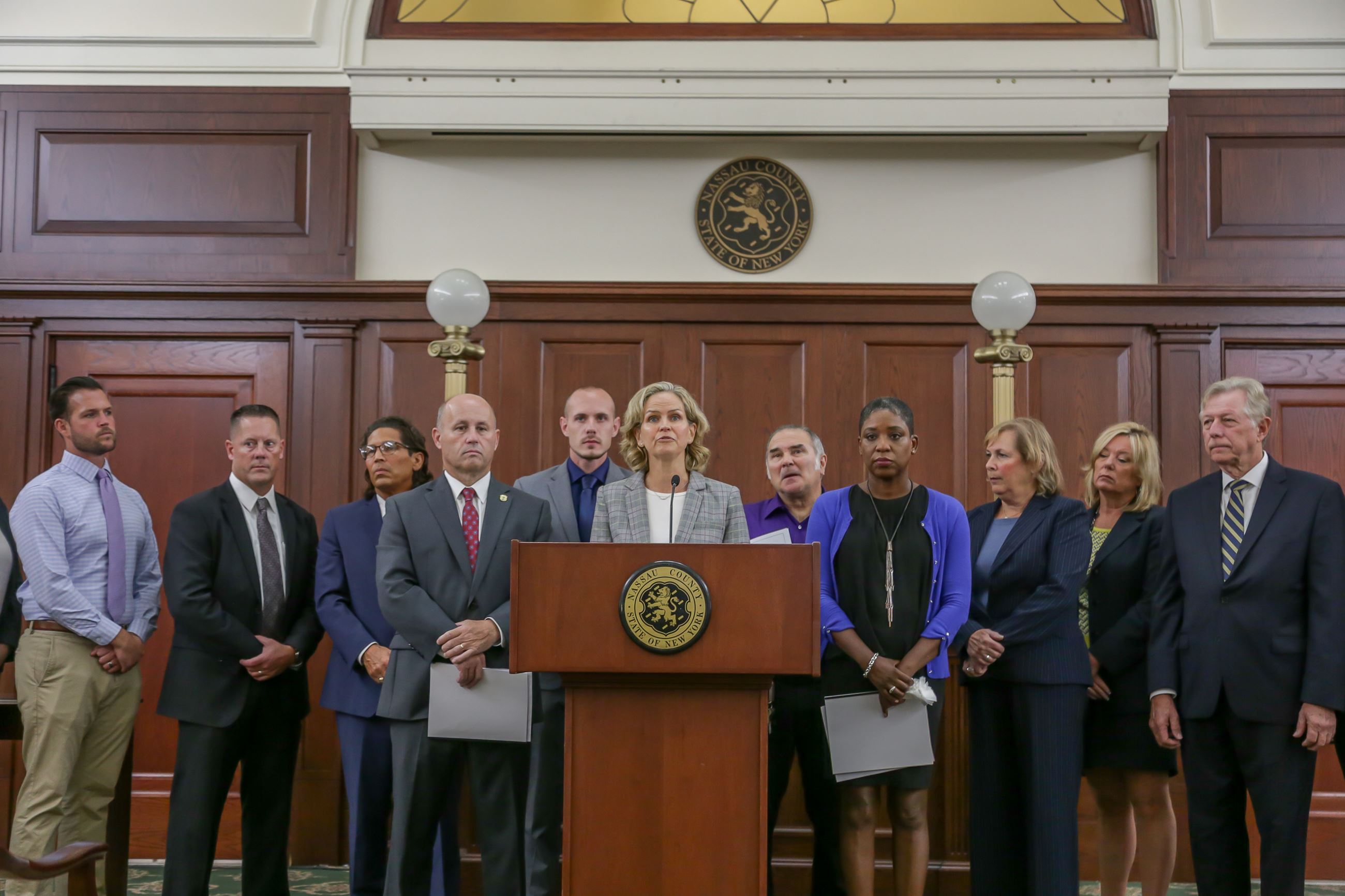MINEOLA, NY – Nassau County Executive Laura Curran was today joined by members of her Opioid Crisis Action Plan (OCAP) Task Force to announce the release of report the Task Force delivered to the County Executive. According to the most recent statistics from the NYS Department of Health, Nassau County’s death from opioid overdose rate is dropping faster than any other large County in New York.
However, County Executive Curran has made clear that Nassau will continue to take proactive and comprehensive action in the realm of enforcement, treatment, and prevention to build on the progress the County has achieved. In May 2019, County Executive Curran formed the OCAP task force to develop a “snapshot” of the opioid crisis’ cost to Nassau County and identify County needs in order to address both the root causes of the crisis and potential long term-impacts.
“Like many municipalities across the nation, Nassau County is engaged in litigation against manufacturers, distributors, and pharmacies for causing the opioid crisis. We will pursue this litigation vigorously. We need to fund services for those devastated by this crisis,” said Nassau County Executive Laura Curran.
The Nassau County Opioid Crisis Action Plan Task Force is comprised of elected officials, top law enforcement from the Police Department and District Attorney’s Office, addiction and drug rehabilitation experts, top mental health professionals, school officials, and other key stakeholders.
Nassau County Opioid Crisis Action Plan Task Force:
- Patrick Ryder, Nassau County Police Commissioner (co-chair)
- Siela Bynoe, Nassau County Legislator (co-chair)
- James Kennedy, Nassau County Legislator
- Pamela Kelly-Pincus, Director of the Office of Alternative Prosecutions and Resources, Nassau County District Attorney’s Office
- Rene Fiechter, Assistant District Attorney and Current Chair of Nassau County District Attorney Singas’ Heroin Task Force
- Mary Faldich, Appeals Court Senior Assistant District Attorney, Nassau County District Attorney’s Office
- Omayra Perez, Director of Community Services, Nassau County Office of Mental Health, Chemical Dependency, Developmentally Disabled
- Dr. Jennifer Morrison, Superintendent at New Hyde Park-Garden City Park UFSD
- Keith Scott, Director of Education at the Safe Center
- Steve Chassman, Executive Director of Long Island Council on Alcoholism
- Jamie Bogenschutz, Executive Director of the YES Counseling Center
“The battle is far from over, but Nassau County is leading the way in the fight against the opioid crisis. Our comprehensive strategy focused on treatment, enforcement, and education is working – but we're not slowing down now. Nassau County will continue to aggressively root out those who deal addiction and violence into our communities, but we will be just as energetic in our focus on prevention through education and early-intervention. I thank my Task Force for producing this report, which will help us shape a bold agenda not just towards eradicating the opioid crisis, but also improving health and safety outcomes for all our residents,” said Nassau County Executive Laura Curran.
“The creation of the Opioid Crisis Action Plan places the professionals in the field together to bring both a historical and current perspective of opioid abuse, thus creating a pathway to recovery from this horrific addiction. The NCPD strategy of Operation Natalie being the face of our approach and its multiprong approach of Awareness, Education, Enforcement, Diversion, Treatment and Aftercare Visits has shown positive results in that we have seen a decrease in both fatal and non-fatal overdoses along with a decrease in NARCAN Administrations. The police department is proud to be a partner with these experts in the field and I hope together we can overcome opiate addictions to better protect our residents, children and communities,” said Nassau County Police Commissioner Patrick Ryder, co-chair of the Nassau County Opioid Crisis Action Plan.
“Researchers have established a clear link between untreated trauma and substance abuse, but all too often, we react to the devastating symptoms of that trauma. We have created a powerful blueprint for a holistic, proactive strategy that identifies and addresses the root causes of substance abuse by employing a trauma-informed therapeutic approach, and I am hopeful that our findings and recommendations will be used to guide the next phase of our community’s response to the opioid crisis.” Legislator Siela A. Bynoe, co-chair of the Nassau County Opioid Crisis Action Plan.
The report is broken down into sections detailing the origins of the opioid epidemic, then addressing various factors including: Prevention, Education, Enforcement, Treatment, Community Coalitions, and Legislation. It also includes select stories of those who have been personally affected by the epidemic.
The report highlights that Nassau County has successfully brought down the opioid overdose rate, logging a 20.1% decrease in opioid fatalities compared to 2017. Despite the inroads made, it notes that Nassau County must remain cautious and committed to combating the opioid epidemic as residents continue to lose their lives to addiction and the consequences of the crisis endure.
The report also identifies early-childhood trauma as a core factor leading to addiction and highlights the direct correlation between experiencing trauma, especially before the age of 18, and substance abuse. The report includes several recommendations tailored to introduce trauma-informed care and education with key stakeholders, especially schools.
The report provides a breakdown of those impacted by the crisis, as well as the estimated cost the Nassau County’s Police Department has incurred to respond to overdose:
- 2016: at least $3,301,440
- 2017: at least $3,245,440
- 2018: at least $2,511,040
Graphic from report (page 33):
These estimated costs do not reflect the full cycle of costs associated with opioid addictions for Nassau County, which are unique to each individual case.
Nassau County Action on the Opioid Crisis
In 2018 Nassau County launched Operation Natalie, a comprehensive campaign focused on treatment, enforcement, and education. Named after Natalie Chiappa, who died of a drug overdose more than ten years ago, Operation Natalie uses mapping technology to identify at-risk communities by linking opioid overdoses and thefts from automobiles, which officials say is the most common crime committed by addicts. The initiative then provided communities with the most overdoses with educational information on treatment and rehabilitation options.
County Executive Curran also signed two bills in 2018 to fight substance abuse — establishing a hotline accessible around the clock and a smartphone application for referrals.
The app, Nassau CARES, which is now free to download at the iTunes store, is designed to provide Nassau residents with convenient access to information about substance abuse and recover resources and services that are available in their community.
The hotline, 516-227-TALK and smartphone app provide on-demand assistance and information to residents in the event of an emergency or other time of need. The hotline provides access to certified substance abuse counselors and trainees who possess knowledge, training and experience in substance abuse counseling referrals.
County Executive Curran has made increasing Narcan trainings countywide a priority, and the Department of Human Services has now trained 15,000 Narcan responders.
County Executive Curran also recently launched Nassau CARES, a free to download app at the iTunes store, is designed to provide Nassau residents with convenient access to information about substance abuse and recover resources and services that are available in their community.
PHOTO CAPTION: Nassau County Executive Laura Curran with co-chairs of her Opioid Crisis Action Plan Task Force, Nassau County Police Commissioner Patrick Ryder and Nassau County Legislator Siela Bynoe
